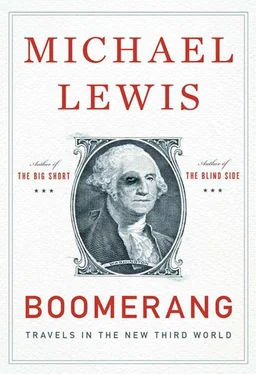When he was elected to the city council in 2000, Reed says, “I hadn’t even thought about pensions. I can’t say I said, ‘Here is my plan.’ I never thought about this stuff. It never came up.” It wasn’t until San Diego flirted with bankruptcy, in 2002, that he wondered about San Jose’s finances. He began to investigate the matter. “That’s when I realized there were big problems,” he says. “That’s when I started paying attention. That’s when I started asking questions: could it happen here? It’s like the housing bubble and the Internet bubble. There were people around who were writing about it. It’s not that there aren’t people telling us that this is crazy. It’s that you refuse to believe that you are crazy.”
He hands me a chart. It shows that the city’s pension costs when he first became interested in the subject were projected to run $73 million a year. This year they would be $245 million: pension and health costs of retired workers now are more than half the budget. In three years’ time pension costs alone would come to $400 million, though “if you were to adjust for real-life expectancy it is more like six hundred fifty million dollars.” Legally obliged to meet these costs, the city can respond only by cutting elsewhere. As a result, San Jose, once run by 7,450 city workers, was now being run by 5,400 city workers. The city was back to staffing levels of 1988, when it had a quarter of a million fewer residents to service. The remaining workers had taken a 10 percent pay cut; yet even that was not enough to offset the increase in the city’s pension liability. The city had closed its libraries three days a week. It had cut back servicing its parks. It had refrained from opening a brand-new community center built before the housing bust, because it couldn’t pay to staff the place. For the first time in history it had laid off police officers and firefighters.
By 2014, Reed had calculated, a city of a million people, the tenth largest city in the United States, would be serviced by 1,600 public workers. “There is no way to run a city with that level of staffing,” he said. “You start to ask: What is a city? Why do we bother to live together? But that’s just the start.” The problem was going to grow worse until, as he put it, “you get to one.” A single employee to service the entire city, presumably with a focus on paying pensions. “I don’t know how far out you have to go until you get to one,” said Reed, “but it isn’t all that far.” At that point, if not before, the city would be nothing more than a vehicle to pay the retirement costs of its former workers. The only clear solution was if former city workers up and died, soon. But former city workers were, blessedly, living longer than ever.
This wasn’t a hypothetical scary situation, said Reed. “It’s a mathematical inevitability.” In spirit it reminded me of Bernard Madoff’s investment business. Anyone who looked at Madoff’s returns and understood them could see he was running a Ponzi scheme; only one person who had understood them bothered to blow the whistle, and no one listened to him. (See No One Would Listen: A True Financial Thriller , by Harry Markopolos.)
In his negotiations with the unions, the mayor has gotten nowhere. “I understand the police and firefighters,” he says. “They think, We’re the most important, and everyone else goes [gets fired] first.” The police union recently suggested to the mayor that he close the libraries for the other four days. “We looked into that,” Reed says. “If you close the libraries an extra day you pay for twenty or thirty cops.” Adding twenty more police officers for a year wouldn’t solve anything. The cops who were spared this year would be axed next, in response to the soaring costs of the pensions of city workers who already had retired. On the other side of the inequality is the taxpayer of San Jose, who has no interest in paying more than he already does. “It’s not that we’re insolvent and can’t pay our bills,” says Reed. “It’s about willingness.”
I ask him what the chances were that, in this pinch, he could raise taxes. He holds up a thumb and index finger: zero. He’s recently coined a phrase, he says: “service-level insolvency.” Service-level insolvency means that the expensive community center that has been built and named cannot be opened. It means closing libraries three days a week. It isn’t financial bankruptcy; it’s cultural bankruptcy.
“How on earth did this happen?” I ask him.
“The only way I can explain it,” he says, “is that they got the money because it was there.” But he has another way to explain it, and in a moment he offers it up.
“I think we’ve suffered from a series of mass delusions,” he says.
I didn’t completely understand what he meant, and said so.
“We’re all going to be rich,” he says. “We’re all going to live forever. All the forces in the state are lined up to preserve the status quo. To preserve the delusion. And here—this place—is where the reality hits.”
On the way back to the elevators I chatted with two of Mayor Reed’s aides. He’d mentioned to me that as bad as they might think they have it in San Jose, a lot of other American cities have it worse. “I count my blessings when I talk to the mayors of other cities,” he’d said.
“Which city do you pity most?” I asked, just before the elevator doors closed.
The aides laughed and in unison said, “Vallejo!”
WELCOME TO VALLEJO, CITY OF OPPORTUNITY, reads the sign on the way in, but the shops that remain open display signs that say, WE ACCEPT FOOD STAMPS. Weeds surround abandoned businesses, and all traffic lights are set to permanently blink, which is a formality as there are no longer any cops to police the streets. Vallejo is the one city in the Bay Area where you can park anywhere and not worry about getting a ticket, because there are no meter maids, either. The windows of city hall are dark but its front porch is a hive of activity. A young man in a backwards baseball cap, sunglasses, and a new pair of Nike sneakers stands on a low wall and calls out an address:
“Nine hundred Cambridge Drive,” he says. “In Benicia.”
The people in the crowd below instantly begin bidding. From 2006 to 2010 the value of Vallejo real estate fell 66 percent. One in sixteen homes in the city are in foreclosure. This is apparently the fire sale, but the characters involved are so shady and furtive that I can hardly believe it. I stop to ask what’s going on, but the bidders don’t want to talk. “Why would I tell you anything?” says a guy sitting in a Coleman folding chair. He obviously thinks he’s shrewd, and perhaps he is.
The lobby of city hall is completely empty. There’s a receptionist’s desk but no receptionist. Instead, there’s a sign: TO FORECLOSURE AUCTIONEERS AND FORECLOSURE BIDDERS: PLEASE DO NOT CONDUCT BUSINESS IN THE CITY HALL LOBBY.
On the third floor I find the offices of the new city manager, Phil Batchelor, but when I walk in there is no one in sight. It’s just a collection of empty cubicles. At length a woman appears and leads me to Batchelor himself. He’s in his sixties and, oddly enough, a published author. He’s written one book on how to raise children and another on how to face death. Both deliver an overtly Christian message, but he doesn’t come across as evangelical; he comes across as sensible, and a little weary. His day job, before he retired, was running cities with financial difficulties. He came out of retirement to take this job, but only after the city council had asked him a few times. “The more you say no, the more determined they are to get you,” he says. His chief demand was not financial but social: he’d only take the job if the people on the city council ceased being nasty to one another and behaved civilly. He actually got that in writing, and they’ve kept their end of the bargain. “I’ve been in a lot of places that have been in a lot of trouble but I’ve never seen anything like this,” he says. He then lays out what he finds unusual, beginning with the staffing levels. He’s now running the city, and he has a staff of one: I just met her. “When she goes out to the bathroom she has to lock the door,” he says, “because I’m in meetings, and we have no one else.”
Читать дальше












